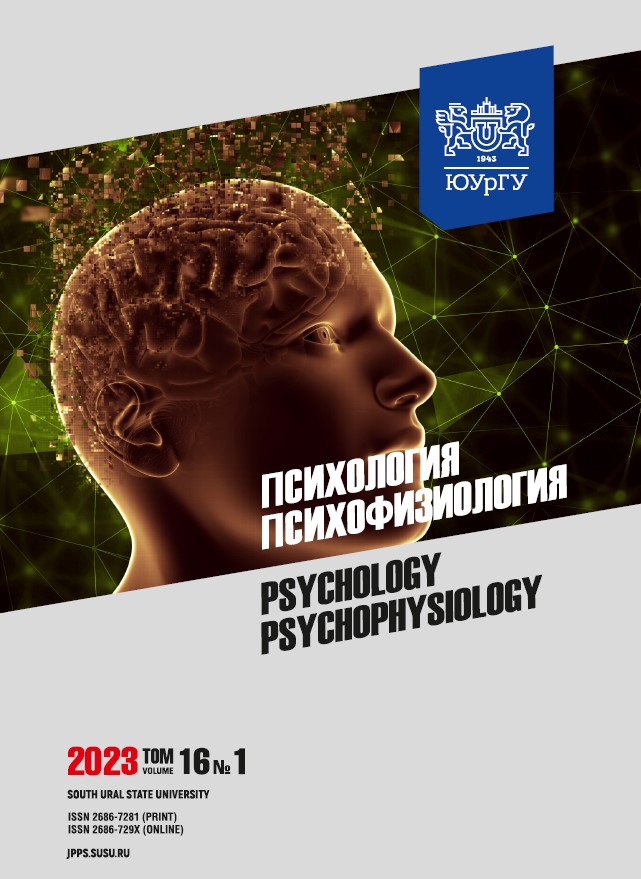Resilience as a resource for the adaptation of foreign students
Abstract
Introduction. Adaptation of foreign students to new social and cultural conditions remains relevant due to the growing number of such students in Russian educational institutions and arises from the personal difficulties foreign students have to face. Aims: to determine the severity of resilience in subjects with different types of social and psychological adaptation, thus clarifying its role as an adaptation resource.
Materials and methods. This paper involves the analysis of literature sources and psychodiagnostic methods, including the hardiness survey and the social and cultural adaptation questionnaire. The data obtained was processed by measuring the central tendency, performing correlation analysis, and identifying significant differences with the Student's t-test. The sample involved 128 foreign students from Russian universities. Results. The role and state of resilience as the most important personal adaptation resource for foreign students were established. The distribution of students was performed with respect to the components of resilience and types of adaptation. Conclusion. The novelty of this approach is associated with establishing the relationship between the components of resilience and the personal characteristics of the subjects who demonstrate a positive or negative type of adaptation.
Downloads
References
2. Lichnostnyi potentsial: struktura i diagnostika [Personal potential: structure and diagnostics]. Ed. D.A. Leontiev. Moscow: Smysl. 2011:680. (in Russ.).
3. Loginova M.V. Vitality as an internal key resource of the individual. Vestnik Moskovskogo universiteta MVD Rossii = Bulletin of the Moscow University of the Ministry of Internal Affairs of Russia. 2009;6:19–22.(in Russ.).
4. Liversage A. Finding a Path: Investigating the Labor Market Trajectories of High-Skilled Immigrants in Denmark. Journal of Ethnic and Migration Studies. 2009;35(2):203–226.
5. Arcand S., Lenoir-Achdjian A., Helly D. Insertion professionnelle dimmigrants récents et réseaux sociaux: le cas des Maghrébins à Montréal et Sherbrooke. Canadian Journal of Sociology / Cahiers canadiens de sociology. 2009;34:330–345. (in French).
6. Wiese E.B., Van Dijk M., Seddik H. La matrice familiale dans limmigration: trauma et résilience. Dialogue. 2009;185(3):67–78. (in French). DOI: https://doi.org/10.3917/dia.185.0067
7. Dioh M.-L. Intégration socioprofessionnelle dans la région de Québec: ressources, choix et stratégies des immigrants du secteur des TIC. Cahiers de lÉDIQ. 2014;2(1):60–65. (in French).
8. Dioh M.-L. Limmigrant au cœur de son integration socioprofessionnelle: Étude de cas des immigrants qualifiésen technologies de linformation (TI) à Québec. Quebec, Canada. 2015:223.
(in French).
9. Guilbert L., Vatz M.L., Bernier E. Les collectivités locales au coeur de lintégration des immigrants. Questions identitairesetstratégiesrégionales, Québec, Les Presses de lUniversité Laval. 2013:241. (in French). DOI: https://doi.org/10.7202/1026764ar
10. Bakker A.B., Demerouti E. Towards a model of work engagement. Career Development International. 2008;13(3):209–223. DOI: https://doi.org/10.1108/13620430810870476
11. Antsyferova L.I. Consciousness and actions of a person in difficult life situations. Psihologicheskii zhurnal = Psychological journal. 1996;1:3–12. (in Russ.).
12. Aleksandrova L.A., Lebedeva A.A., Bobozhey V.V. Psychological resources of personality and socio-psychological adaptation of students with disabilities in the conditions of vocational education. Psikhologicheskaya nauka i obrazovanie = Psychological science and education. 2014;19(1):50–62.
(in Russ.).
13. Leontiev D.A. Personal development in normal and difficult conditions. Kulturno-istoricheskaya psikhologiya = Cultural-historical psychology. 2014;10(3):97–106. (in Russ.).
14. Leontiev D.A., Rasskazova E.I. Test zhiznestoikosti [Vitality test]. Moscow: Smysl. 2006:63.
(in Russ.).
15. Ananiev B.G. Chelovek kak predmet poznaniya [Man as an object of knowledge]. St. Petersburg: Piter. 2001:288. (in Russ.).
16. Rylskaya E.A. Human viability: the concept and conceptual foundations of the study. Sibirskii psihologicheskii zhurnal = Siberian Psychological Journal. 2009;31:6–12. (in Russ.).
17. Kobasa S.C., Maddi S.R., Kahn S. Hardiness and Health: A Prospective Study. Journal of Personality and Social Psychology. 1982;42(1):168–177. DOI: https://doi.org/10.1037/0022-3514.42.1.168
18. Yaroshchuk I.V. Psychology of resilience: a review of theoretical concepts, empirical research and diagnostic methods. Uchenye zapiski Sankt-Peterburgskogo gosudarstvennogo instituta psikhologii i sotsialnoi raboty = Uchenye zapiski St. Petersburg State Institute of Psychology and Social Work. 2020;33(1):50–60. (in Russ.).
19. Maddi S.R. Creating meaning through making decisions. The Human Search for Meaning.
Ed. P.T.P. Wong, P.S. Fry. Mahwah: Lawrence Erlbaum. 1998:1–25.
20. Fominova A.N. Zhiznestoikost lichnosti [Personal resilience]. Moscow: MPGU. 2012:152.
(in Russ.).
21. Kowalski C.M., Schermer J.A. Hardiness, Perseverative Cognition, Anxiety, and Health-Related Outcomes: A Case for and Against Psychological Hardiness. Psychological Reports. 2019;122(6):2096–2118. DOI: https://doi.org/10.1177/0033294118800444
22. Maramis J.R., Cong J. Relationship of hardiness personality with nurse burnout. Abstract Proceedings International Scholars Conference. 2019;7(1):434–446. DOI: https://doi.org/10.35974/isc.v7i1.1046
23. Hamre K.V., Einarsen S.V., Hoprekstad Ø.L. et al. Accumulated Long-Term Exposure to Workplace Bullying Impairs Psychological Hardiness: A Five-Year Longitudinal Study among Nurses. International Journal of Environmental Research and Public Health. 2020;17(7):2587. DOI: https://doi.org/10.3390/ijerph17072587.
24. Halata O.S. Educational persistence and hardiness of university students. The European Journal of Education and Applied Psychology. 2020;1:35–39. DOI: https://doi.org/10.29013/EJEAP-20-1-35-39
25. Maddi S.R. On hardiness and other pathways to resilience. American Psychology. 2005;60(3):261–262.
26. Osin E.N., Rasskazova E.I. A short version of the hardiness test: psychometric characteris-tics and application in an organizational context. Vestnik Moskovskogo Universiteta. Seriya 14: Psihologiya = Bulletin of the Moscow University. Series 14: Psychology. 2013;2:147–165. (in Russ.).
27. Osin E.N. Factor structure of the short version of the Viability Test. Organizatsionnaya psikhologiya = Organizational Psychology. 2013;3(3): 42–60. (in Russ.).
28. Sonin V.A. Psikhodiagnosticheskoe poznanie professionalnoi deyatelnosti [Psychodiagnostic knowledge of professional activity]. St. Petersburg: Rech. 2004:408. (in Russ.).
References on translit
-Copyright (c) 2023 Psychology. Psychophysiology

This work is licensed under a Creative Commons Attribution-NonCommercial-NoDerivatives 4.0 International License.



